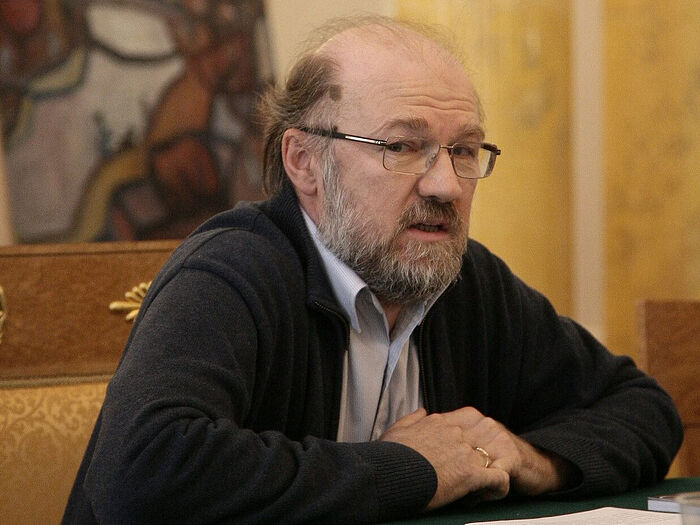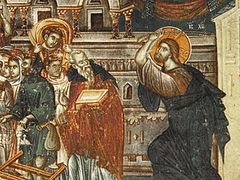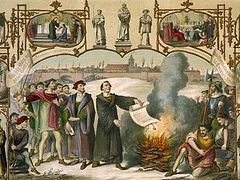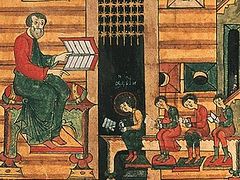In Russia, Greco-Protestantism has been an issue facing the Church since 2018. This movement is an ideological project of liberal factions, attempting to conduct a kind of pseudomorphism in world Orthodoxy. It, like a Trojan horse, defends the idea of transforming not only Orthodox ecclesiastical theology, but also the very church structure itself in the Greco-Protestant spirit.
Pre-History and Context
Greco-Protestantism presents itself as a complex of ideas from a secularized Protestant ethical system, combined with the symbolic language of Orthodoxy and replicating its external cultural form, but nevertheless formed under the influence of secularism and neoliberal ideology.
The decisive role in this formation was played by the radical modernist teaching of the Patriarchate of Constantinople, about the “Greek ethos of Orthodoxy,” which asserts that Orthodox Christians around the world should follow the standards of this ethos and character, formed exclusively in the field of historical Hellenism. The leading role here is played by Greek modernist theologians living in the United States, and influenced by American Protestantism and American foreign policy. In Russia, these ideas are secondary, they are actively promoted by leading theologians who are intellectually dependent on their American teachers.
The latest development in the Greco-Protestant trend was a new version of the modernist “theology after the event”, tied to the events of the coronavirus pandemic. It concerned an “emergency reformation” of the Russian Orthodox Church, under the pretext of “the wrath of God”, manifested in the temporary suspension of public services in churches and the closing of churches due to the spread of the epidemic. The bearers of the Greco-Protestant idea spread the idea among members of the church that “The Lord is expelling us from churches” and, as if as a result of this, “we must reform the Church right now!”
The idea of using theology for “orange purposes” (i.e. this refers to the revolutionary ideology promoted in Russia’s near abroad with Western ties, such as the Orange Revolution in Ukraine, and the later Maidan—Trans.), was born a long time ago and by no means in Russia. Post-pandemic theology was preceded by post-Maidan theology.
The outcome of such rhetoric is usually some theological categorical imperative. Esotericism ultimately gives rise to some kind of powerful technocratic solutions.
The moment related to the pandemic has been missed: the “Orthodox reformation” didn’t happen—the people did not accept it. Nevertheless, the ideas of the infiltration of Russian Orthodox identity with elements of Greco-Protestantism and the related structural changes in the church remain valid. We are talking, in particular, about the replacement of historical ecclesiastical institutions with institutions analogous to secular republicanism, about de-hierarchization and the maintenance of a barely functional schism in the form of a “confederation of free religious communities and associations”, an elected episcopate, “universal priesthood of believers”, a break with canonicity, and the secularization of the ecclesiastical language of the Russian Church.
The vanguard of all these changes, according to the followers of Greco-Protestantism, should be “active parishioners”—analogous with the “active citizens” of the era of the Moscow 2012 protests. The ultimate goal of both is revolutionary upheaval, in one case, in the state, in the other—within the Church, but produced according to the same model.
In the church version, we are talking about a fundamental change of the spirit and letter of ecclesiastical heritage. Instead of Christianization and the spiritual enlightenment of society, it is proposed to secularize the Church itself, bring to it the standards of postmodern and post-humanistic society, and build a simulative “mission.” It is quite obvious that all this, in the event of its actual implementation, would lead to the devaluation of the entire system of Christian values and meanings, to the loss (“resetting to zero,” in the language of Western modernist theology) of the experience of patristic heritage.
“Religious consultants” instead of Priests
The orientation of the Greek Protestant reformationism is expressed in proposals to adjust the content of academic disciplines in the training of clergy. The need for change is explained by the supposed obsolescence of traditional forms of missionary work and preaching. As an effective solution, it is proposed to update the system of spiritual education with an increasingly clear focus on consumerization and psychologizing of preaching and missionary work.
The adaptation of spiritual education to existing secular educational standards leads to the emergence of disciplines such as the basics of PR or secular psychology among the subjects. Liberal Orthodox sentiments are always directly correlated with the secularist agenda.
Ultimately, we are talking about the formation of a fundamentally new type of priest—a religious consultant. A religious consultant, unlike a traditional priest, acts during confession and personal conversations as a psychoanalyst, and in the public sphere as a PR agent who considers church life and heritage as a kind of “asset” to be utilized and monetized.
The content and direction of the sermon delivered by the priest-consultant within the framework of the new disciplinary priorities, radically change the meaning and focus, in fact, are reoriented to new goals, far from Christian missionary work. They make it possible to form a personality whose main qualities do not correlate with Orthodox soteriology.
Dissertations of individual figures, which are considered significant within the Liberal Orthodox community, are often devoted to the domination of the moral over the spiritual, and give priority to postmodern axioms. For example, following the representatives of Protestant theology, it is argued that atheism has an “independent value” because it contains “an invaluable experience of life outside of God.”
The new methodology of the pastoral work within the framework of the postmodern Greco-Protestant movement, is formed on the basis of psychoanalysis, and PR technologies are prescribed to be used as the main methods of preaching. The categories of the ecclesiastical and the divine are thereby moved to the sphere of monetary-symbolic (market) exchange.
There have always been various schools of thought among the clergy in the Church—those of Archpriest Nikolai Guryanov, Archimandrites Abel Makedonov, Naum Bayborodin, Kirill Pavlov, and John Krestyankin, and many others—each of which led to Christ. But the variety of spiritual methods of the elders I have named has nothing to do with the relativistic and constructivist interpretation of the Church's cause and its ideals in the Greco-Protestant doctrine.
Recently, we have seen the fruits of this approach, for example, in the field of culture. Prince Myshkin1 gallops naked across the stage, Lensky and Onegin2 are clinking beer mugs, the conductor of the orchestra comes out in clown makeup—this is all called “updating the classics”. Within this framework, the rules of the game are dictated by the producer invisible to the viewer. And if in culture the output is low-grade pop, then in place of a religious sermon, you will get a factory of heresies and a set of simulacra. In fact, we are already seeing examples of such missionary PR in the United States and Europe, where “politically correct Bibles” are proliferating, and the call to repentance and deliverance from sin is declared to be totalitarian pressure on the individual.
PR-technologies
The tradition of church preaching is being destroyed, the real missionary experience is being discarded as supposedly outdated. The followers of Greco-Protestantism today use the thesis that the activity of the Church, which is aimed at spiritual assistance to a person in the salvation of his immortal soul, is “public relations”. In this case, the false identity of the concepts “the people” (an ontological concept) and “public” (a constructivist concept) is applied.3 The concept of “public” is always ideologically loaded with those who at the moment own the consciousness of the masses, hold the levers of power, and control the political agenda and the media. Party speakers, showmen, propagandists, government officials address the public. The Church, in contrast to them, does not address the public, but specifically the people.4
Lately one often hears about the buildup of “symbolic capital” around Christianity (a term of the leftist sociologist Pierre Bourdieu)—it is obvious that such capital has a comparative, and not absolute value, in comparison with its other types, which in itself contradicts the absolute, timeless and the supra-historical character of Christian values. The reformers who use the theoretical tools of Pierre Bourdieu are silent about the fact that, in the author's understanding, symbolic capital is freely converted into financial capital, and this is its most important property. Meanwhile, the monetization of Christianity and the extraction of profit from the Gospel truths are just as unacceptable as they are impossible—unless you have in mind the experience of paid absolution and the sale of indulgences, which, as you know, largely prompted the Western Reformation in the first place.
Christian preaching has nothing to do with advertising and PR technologies. It does not appeal to the situational needs of a person, not to the needs of his biological and social body, but to the eternal needs of the soul. Whereas every PR advertiser is taught: if you achieve at least one purchase of your product from an individual client, the goal has already been achieved. PR-promotion always creates overestimated needs and sharply reduces the critical thinking of the audience: “Buy now—it’s cheaper”, “you deserve it”, “you have to get the latest model”, “vote—otherwise you will lose”, etc. Advertising appeals to the most elementary mechanisms of perception, but the Church needs an intelligent flock, not a mindless flock; the Church teaches people to listen to their conscience, and not their momentary wishes.
The transformation of the Church into a firm for salvation and gaining grace is impossible, because the Church does not speak “from herself”, but from God, and therefore it is unclear how she would create a corporate identity, the ideology of a church “brand” and other elements necessary for “product promotion.” Also, acting in line with advertising and PR-technologies according to the manuals known in this area, the Church would be forced to engage in “generating demand”, first by calculating and defining its target group. The latter is also impossible, given that the word of God is initially addressed to all people, and not to one or another target group. Thus, an attempt to “promote” the Christian heritage by means of PR technologies and psychoanalytic techniques automatically leads to tangible heretical distortions of the word of God and to the complete desacralization of evangelization.
Strictly speaking, “progress” desacralizes the object, and from the absolute, it automatically becomes relative, finite—not transcendental and transcendental, but immanent and empirical. God is transcendental. “Advancement” turns His image, and His word, into an ordinary product, not just profane, but also completely useless from a Christian point of view.
Psychologizing of demand
As in the sphere of the information economy, in the church, in the “marketed services” offered by Greek Protestantism, there is a psychologizing of demand—the transformation of the thing being sold into a symbol of the buyer’s self-esteem. This separation of the image of something from the thing itself is analogous to the separation of the signifier from the signified, in the postmodern philosophy of language. A person acquires not things, not objects, but status, meaning, and ultimately pays for his own identity, arranged in such a way that without such acquisitions, it could not take place.
The question arises: How can a “PR promoter” bring together the consumer's consumption to his identity, in order to achieve success. There is only one way—to form the needed psychological operations using various methods of self-building (“forming oneself”, “self-help”), used by almost all areas of modern practical psychology. And the initial toolkit for this, of course, is provided by psychoanalysis.
This connection with psychoanalysis and modern psychology is not accidental. The concepts of “Public Relations” and “promotion” appeared in the United States in the 1920s, and their meaning was reduced to psychoanalytic manipulation—it was then that psychoanalysis was at the height of public interest. The objects of manipulation were originally housewives with stable purchasing power. Subsequently, consultants for “public relations” began to be responsible for advertising through focus groups, consisting of the same housewives. Further development of “promotion” led to the creation of methods for generating and stimulating demand. In the 1930s, these technologies were sold to politicians. After some time, Protestants and some Catholics also tried to apply them in their work.
Can psychology be useful at all for the needs of the Church? This question would make sense if it were not for the depressing ideological burden of modern psychology. Its directions not so much analyze their object, as shape it, as a result of which, the object loses free will, choice and consciousness.
Methodology is known to be inseparable from ideology. Psychology aims to help a person “solve his internal problems,” but a certain worldview inevitably lies at the heart of any psychological approach. We will not now touch upon the endless topic of libido and the principle of pleasure associated with psychoanalysis. Take, for example, Gestalt psychology, another popular trend created by the American Fritz Perls, who suggested that the satisfaction of needs be seen as the completion of gestalts—the ability of a person to focus on being “here and now.” The philosophy of gestaltism is based on the belief: “Do only what you think is necessary at the moment. This will allow you in the future not to regret what you are doing now.” Such a life credo excludes long-term guidelines and forms a fleeting short-term consciousness, which limits or excludes responsibility, and hence any kind of salvation. Perception of a person at the point of “here and now” (compare with “you only live once”, “take everything from life”) is an obvious regression for a Christian person. The next step is to shift the problem onto someone else, to sacrifice him, but not yourself.
Christian compassion for a weak, humiliated and oppressed person is not at all the way that psychology preaches now, seeking to adapt a person to a relativistic, non-moral universe, to make him a conformist superman. That is why it makes no sense to substitute the training of counseling psychologists for sacrificial pastoral preaching.
The Church needs its own psychology, which will be built on solid theological foundations—that is, to work as a “servant of theology” in the best sense of the word. This is the kind of psychological analysis we find in Christian asceticism, in the Philokalia. What is lacking is the active development of this experience in the interests of the modern believer.
Conclusion
The long-term goal of the Greco-Protestant “educational reform” is to integrate church life into the secular service economy. That is, into a segment of the social world that operates on the laws of production, consumption and exchange. This is an attempt to build holiness into the world of consumption.
Religious values are given to us from the very beginning; they are not “produced”, “consumed”, and “exchanged”. Christian truths cannot be included in the scope of electoral and political institutions. People do not vote for God, they show faithfulness to Him.
Any “PR promotion”, means a choice from a number of alternatives. But there is only one alternative to God—the devil, there are no other alternatives.
In the twentieth century, there were two attempts at a church reformation or renovation of Russian Orthodoxy—the February and October-Bolshevik Revolutions. Today we are witnessing another attempt, this time in line with the liberal modernist ideology of Greco-Protestantism.
Provided that the authentic patristic tradition is faithful, the Orthodox Church organism will overcome the launched process of external and internal schisms. Just as the “end of history” promised to us did not take place at the end of the 20th century, so today the “new Enlightenment” and “endless” modernity will not take place. Our spiritual sight will enable us to distinguish between the wheat and the chaff.





